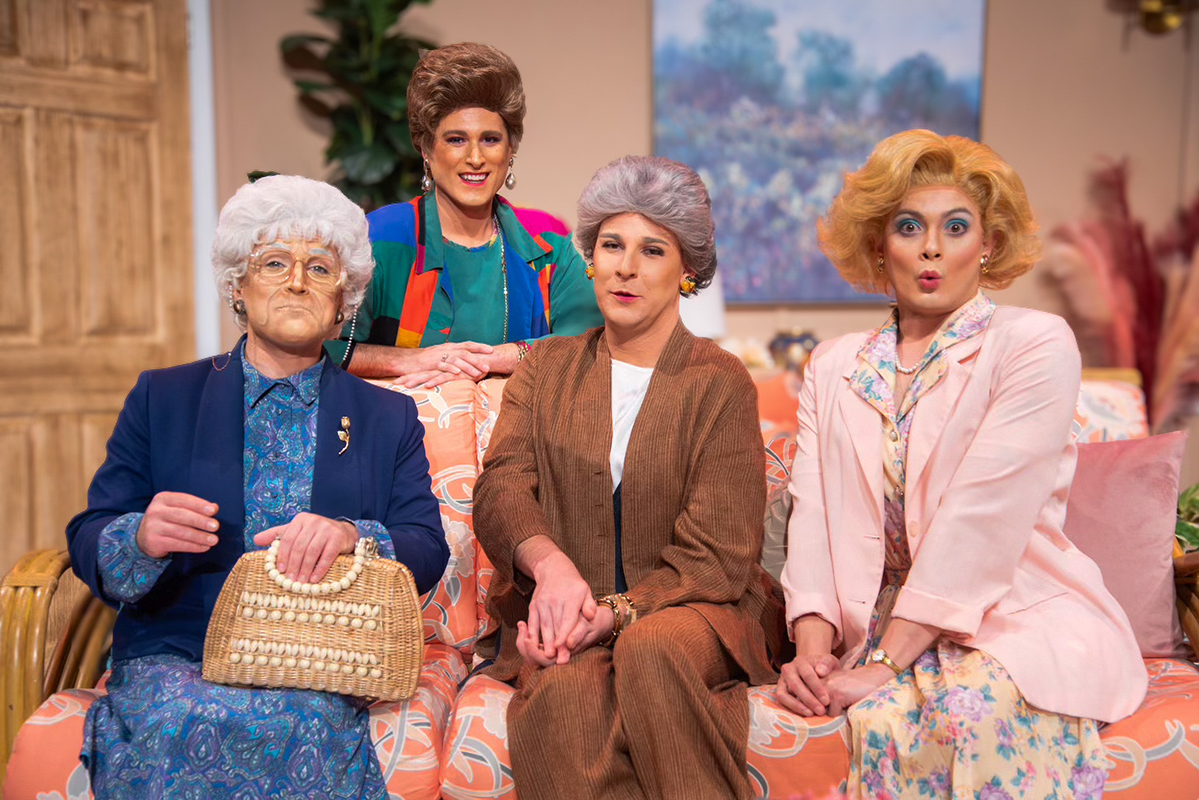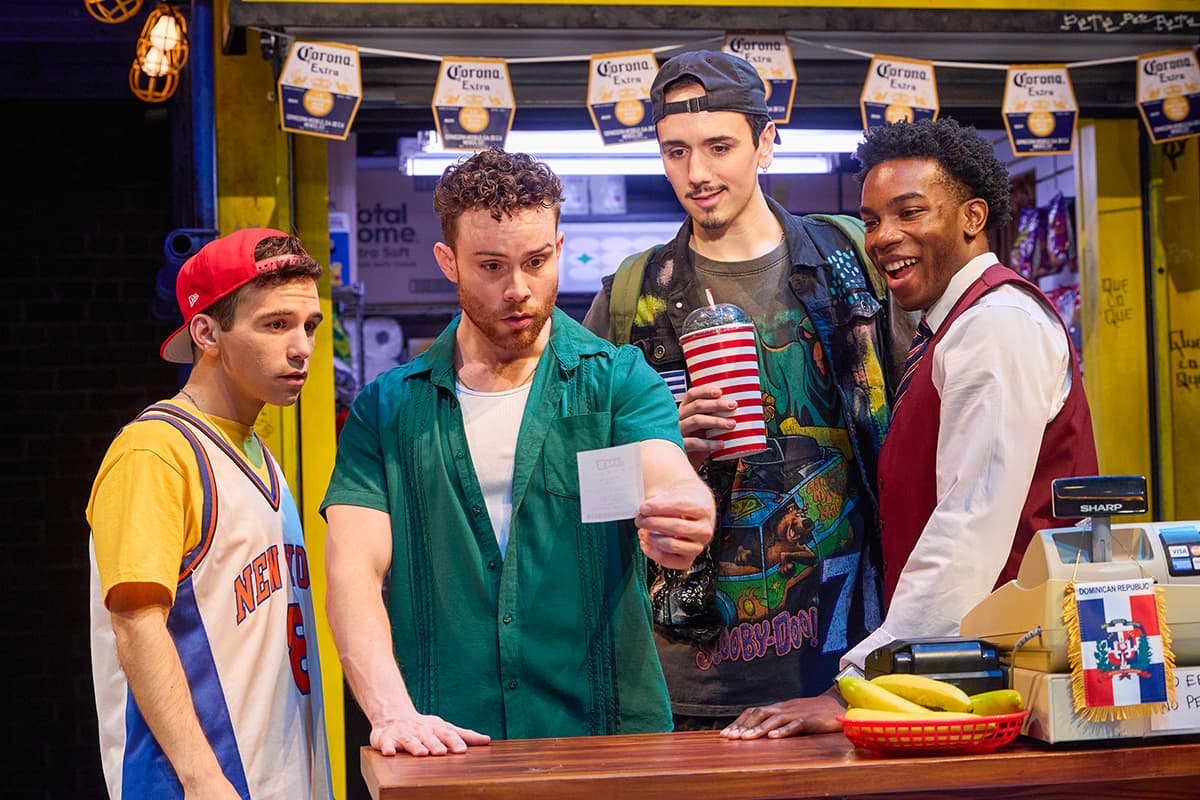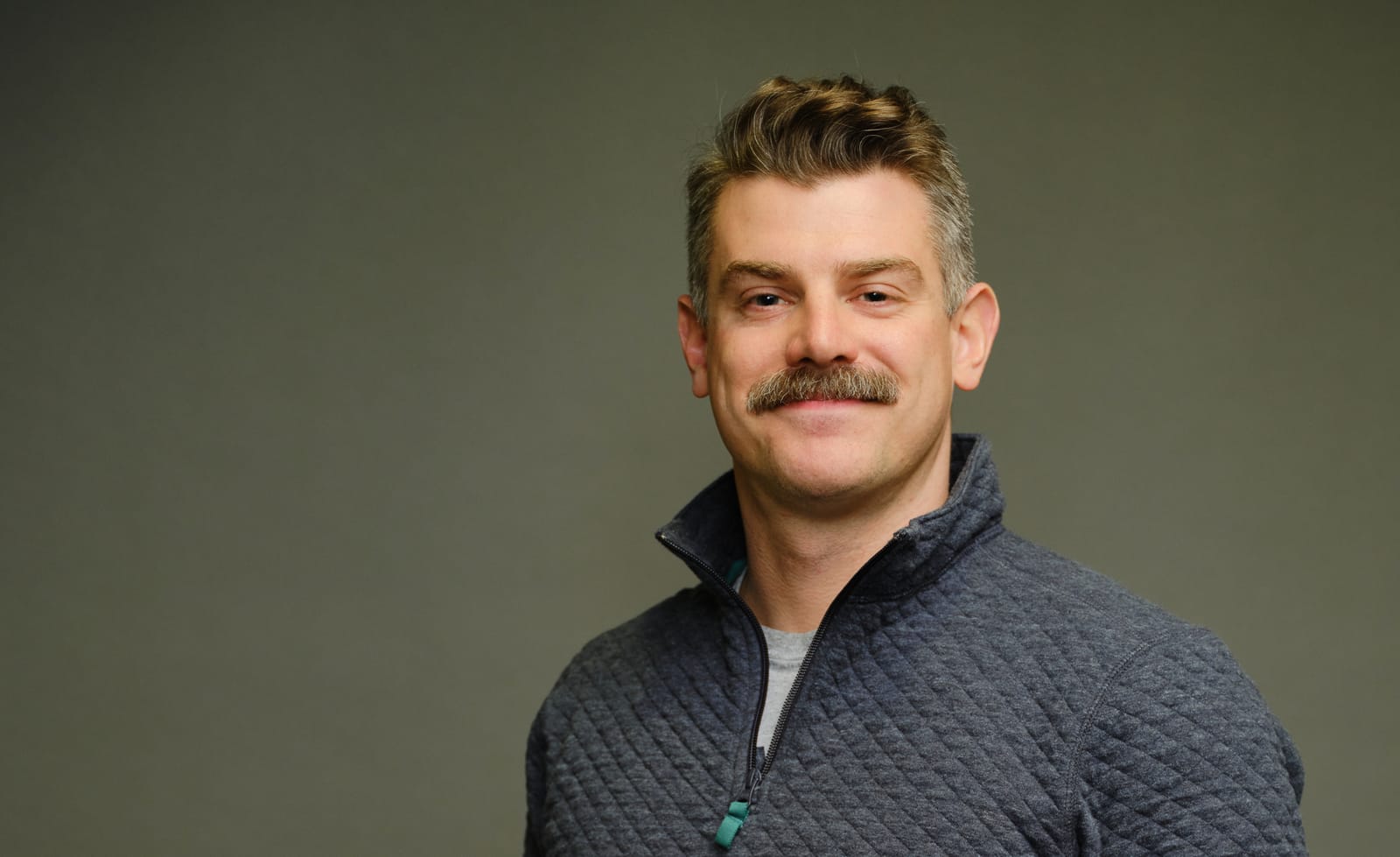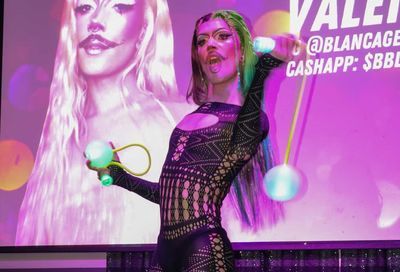‘Which Way to the Stage’ Review: Wicked Ways
A comic love letter to theater fans, 'Which Way to the Stage' hits its marks with affection and pinpoint accuracy.
By André Hereford on December 29, 2022 @here4andre

Ana Nogueira’s perceptive comedy Which Way to the Stage (★★★★☆) celebrates and sends up all things theater in its well-constructed tale of two New York City actors, Jeff and Judy, whose friendship is tested when handsome stranger Mark comes between them.
The play, currently at Signature Theatre, generalizes shamelessly about theater folk, yet nails several very specific targets, from hyper-vigilant stage-door stans to sexually ambiguous heartthrobs like Mark who leave gay guys and straight girls alike hopefully pondering.
Director Ethan Heard captures that specificity first of all in the casting. Dani Stoller and Mike Millan match up fruitfully as besties Judy and Jeff, both talented, ambitious performers who worship at the altar of the performer they mutually idolize: Broadway star Idina Menzel.
Michael Tacconi is well-cast, too, as toothsome, tousle-haired Mark, also an actor, though, relative to Jeff and Judy, much less intense in his devotion to craft and career. Tacconi pulls off Mark’s true talent, his understated seductiveness, a cunning tool for success on and off the stage.

Judy is definitely susceptible to Mark’s charms when they meet at an audition for a summer stock production of Avenue Q. But she leaves unsure whether he was coming on to her, or was in fact hitting on the bombshell actress (Nina-Sophia Pacheco) who also showed up at the audition. Then again, Jeff meets Mark, and maybe Mark comes on to him, too.
Those “I don’t like labels” guys can be painfully confounding, especially within the musical theater space, but Mark knows it pays to play to every audience. The script makes the character savvy enough to acknowledge his pretty privilege, while the performance and direction ensure he’s just unaware enough to still be funny.
Jeff and Judy are practically Idina Menzel stalkers, but they’re funny, rather than sad, for obsessively waiting outside the theater where “the wickedly talented Adele Dazeem” belts her way through If/Then almost every night.

Of course, Nogueira has baked in a bounty of pithy musical theater punchlines, and inside jokes tailored to fans of the esteemed Miss Dazeem, among other divas of the Great White Way. We meet Jeff and Judy excitedly debating who did a better Mama Rose, Bernadette Peters or Patti LuPone, and agreeing on at least one count: both divas did it better than Imelda Staunton.
Jeff and Judy disagree vigorously and often — over musicals, over Mark, over Jeff’s drag interpretation of Idina Menzel, over the very idea of female impersonation as entertainment. The hyper-competitive pair even argue over which of them is the star of their story and which one’s the sidekick. Maybe they’re both the sidekick, or maybe neither is.
Nogueira raises a number of intriguing questions about the roles the friends play in one another’s lives, and the roles they’re allowed to play onstage. Will talent be enough to propel Judy to the next phase of her career, or is she missing something that comes fairly naturally to some of her peers? Can Jeff, who embraces his feminine fabulousness, find his place in an industry that welcomes queer folks but prefers to thrust straight-presenting dudes to the top?
Squaring off like opponents in the ring within the compact forum of Richard Ouellette’s versatile brick-wall set, the characters hash out their differences in engaging, even-handed tête-à-têtes. Each member of the cast — including Pacheco, who doubles as a ditzy bachelorette at a bar — adds to the lighthearted, if unsubtle, skewering of certain amusingly recognizable types. And recognizable actresses, with Stoller delivering a spot-on Bernadette Peters.
The company falters only in the final scene, in which a pivotal drag performance doesn’t ring a bell as the bold, brilliant revelation the play seemingly intends it to be. Or perhaps Heard’s direction aims towards a different intention, which just doesn’t transmit as clearly as the rest of Nogueira’s well-wrought exploration into the roles we perform for money, for art, for love, or just for the applause.
Which Way to the Stage runs through Jan. 22 at Signature Theatre, 4200 Campbell Ave. in Arlington, with a Pride Night performance on Jan. 20. Tickets are $40 to $90. Call 703-820-9771, or visit www.sigtheatre.org.
Ryan Bernier’s Golden (Girls) Ticket
Ryan Bernier has been playing Dorothy in "Golden Girls: The Laughs Continue" for two years and shows no signs of stopping.
By Randy Shulman on March 16, 2025 @RandyShulman
"This is the first time I've had a role for this long," gasps Ryan Bernier. "We just hit our 300th performance of the show in Detroit in January!"
The show is Golden Girls: The Laughs Continue, a warmly loving, gut-bustingly funny stage parody of the hit NBC series that ran for seven seasons from 1985 to 1992, and lives on in perpetuity in reruns. Bernier portrays Dorothy, made iconic by the indomitable and legendary late Bea Arthur, for whom the 6'3" actor is also a dead ringer.
To prepare for the role, which Bernier plays in full drag, he "consumed everything that Bea Arthur had ever done -- and we're talking from Maude to her brief gig on the Star Wars Holiday Special to her brief voiceover role in Futurama. She was a performer who really found a way to bring all of the tools in her toolbox to every project that she picked up.
‘In the Heights’: Signature’s Bustling Barrio
Every person on the block has a story and a song about how they got there in Signature’s high-flying "In the Heights."
By André Hereford on February 23, 2025 @here4andre
No matter how far theatergoers may roam from that corner of upper Manhattan put on the map by Lin-Manuel Miranda and Quiara Alegría Hudes' Tony-winning In the Heights, they can always return again.
First, because barely a season goes by that a production doesn't spring to life somewhere near you, wherever you may be. For the DMV this season, that means Signature Theatre's terrific new production, directed by James Vásquez. And, of course, there's always the vibrant, gorgeously shot movie by Wicked director Jon M. Chu.
More crucially, though, the show's creators baked into Hudes' book and Miranda's music and lyrics a feeling of warm familiarity with these streets and New York Latino culture. The characters on this particular block, passionately singing and dancing their way through intertwined lives, form an inviting community. It's fun to return to their barrio from time to time.
What It Means To Be Queer at the Oscars
Put on your ruby slippers to strut down the red carpet as we ask what queerness means for Academy Awards voters past and present.
By Paul Klein
March 1, 2025
On March 2, Hollywood's elite will gather at the Dolby Theater in Los Angeles for the glitziest night of the year -- The 97th Academy Awards. When the Oscar-cast goes live on ABC Sunday evening -- and, for the first time ever, simultaneously streams on Hulu -- seven LGBTQ individuals will sit in hushed anticipation at the possibility of winning Hollywood's highest honors.
For a body often criticized for its lack of diversity and inclusivity, and with the arts under a prolonged political attack from far-right politicians, Sunday night offers a number of potentially groundbreaking moments for queer representation in front of and behind the screen.
Support Metro Weekly’s Journalism
These are challenging times for news organizations. And yet it’s crucial we stay active and provide vital resources and information to both our local readers and the world. So won’t you please take a moment and consider supporting Metro Weekly with a membership? For as little as $5 a month, you can help ensure Metro Weekly magazine and MetroWeekly.com remain free, viable resources as we provide the best, most diverse, culturally-resonant LGBTQ coverage in both the D.C. region and around the world. Memberships come with exclusive perks and discounts, your own personal digital delivery of each week’s magazine (and an archive), access to our Member's Lounge when it launches this fall, and exclusive members-only items like Metro Weekly Membership Mugs and Tote Bags! Check out all our membership levels here and please join us today!
The Magazine
-
Most Popular
 'Porn Star University' Started by Gay-for-Pay Creator Andy Lee
'Porn Star University' Started by Gay-for-Pay Creator Andy Lee  Win Tickets to Awesome Con!
Win Tickets to Awesome Con!  Awesome Con Celebrates the Geek in All of Us
Awesome Con Celebrates the Geek in All of Us  The Commanding Style of Nathan Lee Graham
The Commanding Style of Nathan Lee Graham  Montana Governor Signs Anti-Trans Bills into Law
Montana Governor Signs Anti-Trans Bills into Law  Trump Targets Law Firm for Defending Transgender Rights
Trump Targets Law Firm for Defending Transgender Rights  Riki Wilchins: 'Not Passing is Now a Criminal Offense'
Riki Wilchins: 'Not Passing is Now a Criminal Offense'  Anheuser-Busch Abruptly Ends Sponsorship of St. Louis PrideFest
Anheuser-Busch Abruptly Ends Sponsorship of St. Louis PrideFest  Texas 'Sexual Content' Bill Would Criminalize Literary Works
Texas 'Sexual Content' Bill Would Criminalize Literary Works  Film: Spring Arts Preview 2025
Film: Spring Arts Preview 2025
 3 Million People Could Die Due to HIV Funding Cuts
3 Million People Could Die Due to HIV Funding Cuts  Celebrities Urged to Boycott Hungary Over Pride Ban
Celebrities Urged to Boycott Hungary Over Pride Ban  The Commanding Style of Nathan Lee Graham
The Commanding Style of Nathan Lee Graham  Texas 'Sexual Content' Bill Would Criminalize Literary Works
Texas 'Sexual Content' Bill Would Criminalize Literary Works  Awesome Con Celebrates the Geek in All of Us
Awesome Con Celebrates the Geek in All of Us  Win Tickets to Awesome Con!
Win Tickets to Awesome Con!  Film: Spring Arts Preview 2025
Film: Spring Arts Preview 2025  Classical & Choral Music: Spring Arts Preview 2025
Classical & Choral Music: Spring Arts Preview 2025  Broadway: Spring Arts Preview 2025
Broadway: Spring Arts Preview 2025  Gallery: The Emotionally Sensual Artwork of Soltian
Gallery: The Emotionally Sensual Artwork of Soltian
Scene
Metro Weekly
Washington's LGBTQ Magazine
P.O. Box 11559
Washington, DC 20008 (202) 638-6830
About Us pageFollow Us:
· Facebook
· Twitter
· Flipboard
· YouTube
· Instagram
· RSS News | RSS SceneArchives
Copyright ©2024 Jansi LLC.











You must be logged in to post a comment.